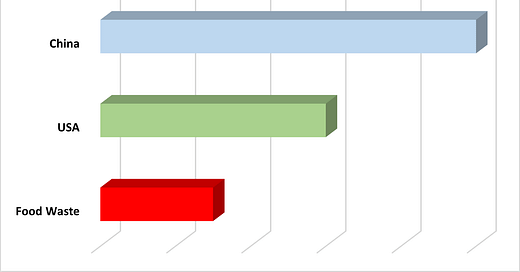100 Jobs Every Week
IN THIS ISSUE (you’re a great reader - you can do it in four minutes)
Food waste considerations. Food waste and the associated emissions are great examples of why we need to think differently.
100 jobs. Our readers are passionate about the cleantech space and want to get involved. As we grow, we are excited to have roles available to readers, but we don’t know the timeframe, and interest will always exceed capacity. To help people today, we will start listing 100 open roles every week.
Emissions Decisions is a weekly newsletter investigating our thesis on environmental trends/solutions. In its initial form, it is about hypothesis testing, and in its later stages, it will provide everything you need to help the environment and even make money while doing so. In return, this medium gives us steady feedback while we build our company. Our long-term goal is to provide tools that power optimal environmental decisions. We truly appreciate the support in achieving this!
Existing subscriber? You don’t need to do anything, but please share.
Was this forwarded to you? Become one of our subscribers by clicking below.
This week’s theme/question: How should we consider food waste?
Food waste for the average family is estimated at 30%. There is an actual cost and an environmental price tag since emissions went into making, transporting, storing, and disposing of that wasted food.
Total food waste contributes approx. 8% of global GHG emissions, according to the Food and Agricultural Organization of the United Nations. This is incredible and incredibly disappointing. To put that into context, that would make food waste the third largest emitting country globally.
Emissions Contributions
Another way to think about it - solving food waste would be better for the environment than taking half the cars off the road.
Food Waste Contribution Breakdown
Sourced to the USDA. We have no idea who “Nuts” bribed to get on this chart.
A final complexity is that it is difficult to incentivize change within industry. Food waste in the home has been purchased. It represents emissions but also revenues. If food waste is eliminated by 10%, that means 10% less revenue for the industry (potentially more, given the concentration of waste in products such as dairy).
The themes above capture the complexity of quantifying food waste to reduce emissions. As we work through these calculations, we have outlined considerations below. Our goal is always transparency and education (including ourselves), so please provide your thoughts.
Emissions by food category to start
Adjust those emissions for transport and regional disparities (we’ve seen environmental policies create more inefficiency/emissions by assuming every region is the same)
Emissions per unit of food then need to be adjusted by the waste in that supply chain
The wastage footprint needs to then be adjusted for what consumers can control
The result is identifying low-emission foods and foods where you can reduce emissions further by simply not wasting them when purchased. This is useful, even to drive small changes.
IN PARTNERSHIP WITH ROSE & MCCLARTY
A big part of lowering emissions is providing energy more efficiently. The firms responsible must constantly tell their story to clients and stakeholders. Rose & McClarty assists them with copywriting, content strategy, social media, and content writing.
Learn more and get in touch with their team using the link below.
100 Jobs
It’s that simple - we will list jobs to help accelerate the sector. If we can provide intros to companies that are partners, we are happy to. Feel free to reach out to check.
Director of Environmental Assessments and Preliminary Design, Morrison Hershfield
Global Sustainability & Climate Technology Operations Senior Manager, Deloitte
Senior Manager, Technical, Clean Economy Investment Tax Credits Team, Deloitte
Canada Research Chair Tier I - Environmental Sustainability, University of Regina
Sr. Analyst, Sustainability, Restaurant Brands International Inc.
Manager, Strategic Execution - Sustainable Products, McCain Foods
Senior Manager, Procurement Sustainability and Supplier Diversity, Accor
Staff Scholar (STS and Sustainability), University of Toronto
Analyst, Enterprise Risk (ERM) and Sustainability Performance, Vancouver Airport Authority
Senior Environmental Specialist, Vancouver Airport Authority
Sustainability, Health & Safety Manager, Badger Infrastructure Solutions Ltd.
Renewable Energy Junior to Intermediate Biologist, Green Cat Renewables
Sr. Manager/Director, Digital Innovation, Evolugen
HR Business Partner, Evolugen
(72 remaining jobs are continued on our terrible website later each week to stay within email limits)
How you can help our cause:
We are assembling a database of products that are helpful for the environment. If you make these products as a business or know someone who does, please share them or this newsletter.
Send any ideas to info@emissionsdecisions.com
Was this forwarded to you? Become one of our subscribers by clicking below.
Thank you for your time and your thoughts.










